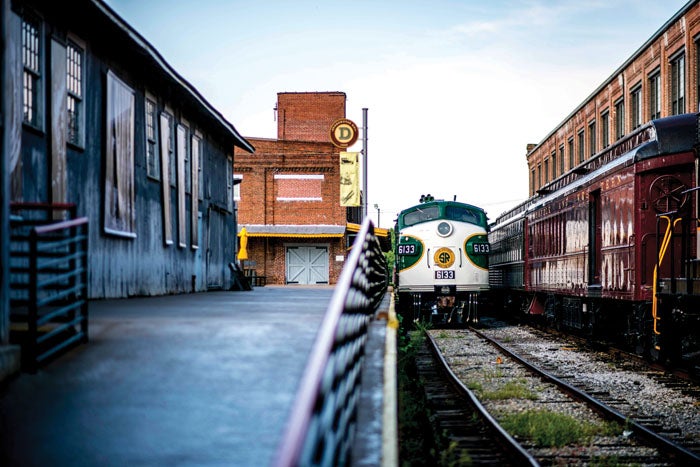‘Hanging on by a thread’: County pleads for restriction relief at NC Transportation Museum
Published 7:40 pm Monday, August 3, 2020

- JON C. LAKEY / SALISBURY THE MAGAZINE Southern Railway #6133 sits at the North Carolina Transportation Museum in Spencer. The locomotive was built by the Electro-Motive Division of General Motors in 1950.
SALISBURY — The N.C. Transportation Museum is a major economic force in Rowan County, with more than 100,000 visitors from across the region coming to the facility every year. Those visitors account for nearly 10% of all tourism dollars spent here, according to the Convention and Visitor’s Bureau.
But those economic benefits have been sharply curtailed by COVID-19 restrictions enacted by state government and aimed to reduce the spread of the pandemic, leading to what Spencer Mayor Jonathan Williams calls “a loss of vitality to the town.”
“There’s just not that hustle and bustle around town that we’re used to seeing with the museum,” Williams said.
In May, the museum opened for outdoor-only, self-guided tours, but despite attempts to do so it still cannot open exhibits or offer train or turntable rides. Its popular Day Out With Thomas event has been canceled; local officials say they’re also starting to worry about the status of the annual Polar Express event in November, a major fundraiser for the museum.
Visitors to the museum eat at local restaurants, buy gas and spend money elsewhere in the community, Williams said. During particularly large events, visitors fill the parking lot of Park Plaza and walk across the street for a day at the museum. County leaders project the community will see the evaporation of a $22 million yearly boon to the local economy if things stay in their current state.
Mandatory reductions in service offerings have also had a major negative effect on the museum’s budget, which is funded primarily by revenue it generates through local events. While local staff members at the museum referred questions to the N.C. Department of Natural and Cultural Resources, the state agency in charge of the museum, Rowan Convention and Visitor’s Bureau CEO James Meacham said a continued closure would be a major blow.
“I don’t know how long it can sustain this way,” Meacham said.
In an effort to limit the negative effects of mandatory COVID-19 shutdowns, Rowan County commissioners on Monday passed a resolution by a 4-0 count that endorses re-opening the N.C. Transportation Museum with protocols in place for cleaning, social distancing and use of protective equipment. Commissioners said the resolution will be sent to the governor and state legislators who represent Rowan County.
“They’ve become such a big part of the community, so much more of a bigger part than they have been in the past. They’re just hanging on by a thread right now,” Edds said about the museum.
Commissioners’ resolution specifically points to the Great Smoky Mountains Railroad as an example of a disparity in treatment. The railroad, which is not state-owned, resumed train operations and opened its museum and gift shop on June 4, says a news release on its website. Its rides are several hours long, while rides at the N.C. Transportation Museum are 20 minutes or so, Edds said.
Privately and publicly owned facilities should be treated the same, Edds said.
“We just want to see that Rowan County’s museums are treated the same as others around the state,” he said.
County Attorney Jay Dees said the N.C. Transportation Museum had been declared an amusement park by state officials and, therefore, ordered to remain mostly closed. Dees asked aloud during Monday’s meeting what standard state health officials were using to keep the museum closed when businesses like the Great Smoky Mountain Railroad could open.
“This is where we are today,” Edds said following Dees’ comment.
House Bill 258, which was vetoed by Gov. Roy Cooper last month, would have authorized amusement parks to resume operations. In his veto message, Cooper said, “Tying the hands of public health officials in times of pandemic is dangerous, especially when case counts and hospitalizations are rising. State and local officials must be able to take swift action during the COVID-19 emergency to prevent a surge of patients from overwhelming hospitals and endangering the lives of North Carolinians.”
Commissioners and Meacham, who spoke to the Post after the meeting, point to 60 acres of land on which the museum sits as well as the size of some buildings as allowing for a safe experience. The Back Shop, once the largest industrial building in North Carolina, is hundreds of feet long and dozens of feet tall.
Currently, the museum is using reserves to maintain buildings and equipment with no revenue coming in, said county officials. Roy Johnson, president of the board for the museum’s foundation, asked for help from commissioners, Edds and Dees said.
Asked about the resolution after the meeting, N.C. Transportation Museum Executive Director Kelly Alexander referred questions to Michele Walker, a public information officer for the Department of Natural and Cultural Resources. Walker said she didn’t have enough information about the details of the resolution to provide a response immediately. Mark Brown, who handles public relations and marketing for the museum, said he had not seen the resolution.
Williams said he understands the N.C. Transportation Museum has to abide by state rules because it’s a state-owned facility. Still, he said the Spencer Board of Aldermen would discuss taking action similar to commissioners. He said the museum is “going to be better prepared than most places” to enforce social distancing rules, require the use of protective equipment and conduct regular cleaning.
“We’re obviously very supportive of the museum, and I think the feeling is mutual from the museum — they want to see the town succeed,” Williams said. “They’ve got some tough times ahead if things don’t open back up.”


